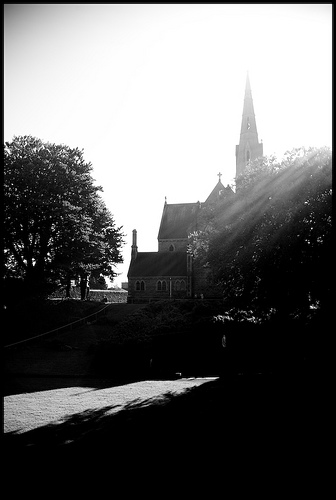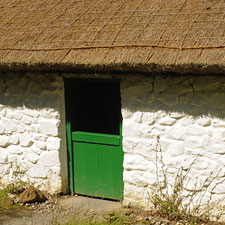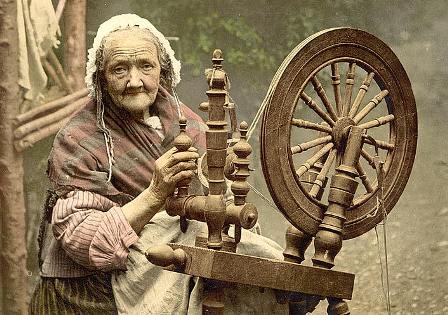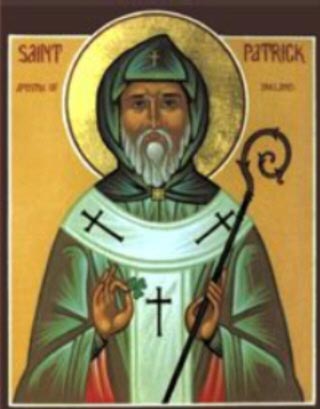Irish Wedding Customs and Traditions
 Irish Wedding customs- Marry between Christmas and
Irish Wedding customs- Marry between Christmas andLent and never on a Saturday- photo by Gordon Flood
There are lots of Irish wedding customs and traditions on the wee island of Ireland to enjoy. Many have died out over the years or are confined to just a certain part of the country. Still, it can be fascinating and fun to learn about these Celtic wedding traditions and many associated superstitions.
I suppose that's a little warning too. When you read about wedding customs, traditions and superstitions in Ireland don't assume too much. You may be disappointed if Irish people are no longer aware of the traditions and there may be many reasons for that. Sometimes, it is simply because they may have disappeared and are remembered only by some of the older people. Other times it is because they are just limited to just a specific, province, county or village.
I remember going to a friend's wedding a few years ago in a small village called Caltra near Ballinasloe in East Galway. When the wedding ceremony finished in the church we all headed to the reception in our cars. It was a wonderful little surprise to see that, as we passed in our cars, people in the area had lit bonfires of sticks in front of their houses. They waved to us as we went by and shared in the happiness of the day. It was an Irish wedding custom I hadn't seen anywhere else in the country but it made the day that bit more special.
Irish Wedding Customs
Where to marry
In the distant pass the Irish wedding tradition was to marry in the open air, often in a place of spiritual significance. Later it became common to have the ceremony in the home of the bride, then over it time it changed to marrying on the steps of the church until finally the wedding ceremonies started to be held in the church itself. Most weddings today in Ireland still take place in a church but there are an increasing number of marriages which take place in a registry office.
A type of Irish Wedding proposal
As Christian Ireland developed, different traditions developed around the country. One interesting Irish wedding tradition in Donegal was for a man who had identified the woman he wanted to marry. He went to her house accompanied by a friend and threw his cap into the house when the door was opened. If the cap was thrown back by the girl, it meant she wasn’t interested.
 Irish wedding traditions -Donegal
Irish wedding traditions -DonegalThrow in the cap and hope for the best
- photo by nmni
Holding on to your man
Another interesting wedding custom tells of how a woman took steps to ensure fidelity. The tradition was for the bride on her wedding day to give her husband a drink in secret and utter the words
"This is the charm I set for love,
A woman’s charm of love and desire:
You for me and I for thee and for none else;
Your face to mine and your hand turned away from all others".
Never marry in Lent
Irish wedding tradition and custom meant that no wedding ceremonies could take place over Lent (the 40 day period prior to Easter Sunday) so Shrove Tuesday (Pancake Tuesday), the day before Lent began was the last chance till after Easter.
The period from Christmas to Lent was the most popular marrying period. There was quite a bit of pressure on courting couples and single people to tie the knot during that period as others wanted a celebration and all that entailed.
The day of the week was important and regionally there were differences luck days to exchange wedding vow. It was said:
Monday for health,
Tuesday for wealth,
Wednesday the best day of all,
Thursday for losses,
Friday for crosses and
Saturday no day at all.
Today most people in Ireland prefer a summer wedding when the hope without guarantee is for better weather!
Chalk Sunday
The first Sunday in Lent was known as ‘Chalk Sunday’and it was then that tricks were played on those men that were single. The custom was for young men to mischeviously creep up on bachelors and mark their back with chalk. Often these young lads would approach their victim as people gathered for Mass. If caught they had to run for their lives.
Irish Wedding Tradition -Luck money
Another Irish wedding tradition in parts of the country was for the grooms to give 'luck money' to the bride’s parents to bring good luck on the house. This could be a sizeable amount of money and a great deal of pride was associated with it.
While this did not survive, the idea of ‘luck money’ was still around when buying cattle when I was a child. I remember driving around the Mayo countryside with my uncle buying cattle. When the deal was done, it was common for the seller to give back a certain discretionary amount to the buyer. If a bullock cost 300 pounds, 20 pounds might be handed back as the buyer left. The buyer could feel insulted if he felt it wasn’t enough.
Becoming the new mistress
When a bride entered her new home, by custom her mother-in-law would break a cake of bread over her head, as a token that she would take over as the woman of the house.
Wedding Tradition in Ancient Ireland
The Wedding Contract- be neither landless or fat!
Up until the arrivals of the Normans in Ireland in the 12th Century, marriage in Ireland was a pretty casual affair. Couples could marry for one year fixed and either party could withdraw when the year was up.
But making a marriage contract was a more complicated affair. Marriage was considered 'a social connection for the purposes of procreation'. This meant that a man who was infertile or impotent (referred to funnily enough as an 'unarmed man') could not make a contract or the marriage contract could be broken for that reason.
If you were a man with no land referred to as 'a rock man' you could not marry because you had no wealth to bring to the marriage. (Who knows? Maybe the Irish love of buying property stems from this far back.)
A very fat man could not marry because he was considered to be unable to perform his duties. A churchman you could also not marry as it was forbidden from the 5th Century.
Paying to Marry
The prospective husband paid a coibche, an amount of money to the girl’s father, who then divided it with the head of the tribe. A certain sum was paid each year during the marriage but in the second year, the wife got a portion of the amount for herself which increased over the years.
There were other types of payment such as a tionnscar which was a payment made to the father of the bride who came from outside her husband’s tuath (kingdom). It was valuable and transportable, usually gold, silver, copper or brass.
The Ideal Woman
 Sewing and spinning were valued skills
Sewing and spinning were valued skillsIrish wedding Customs-photo by Library of Congress
Irish wedding custom considered the ideal bride to be one with a pleasant speaking voice, a sweet singing voice, good sewing skills, cleverness and if possible virginity (though in Celtic Ireland this was not essential).
Women's rights in ancient Ireland
Ddespite what you might be inclined to think, a woman’s status in ancient Ireland under Brehon law (the ancient Celtic law of Ireland which survived in some format until the 17th Century) was quite protected against exploitation. Wives were described as ‘co-lord’ with rights. Both husband and wife had responsibility for buying and selling livestock and any horse or ox which was no longer wanted could not be sold without consultation. Money earned was for the benefit of both.
Eldest to Marry
As in other cultures, Irish wedding custom meant that the eldest girl in a family was the first to marry and her sisters married then according to age.
Spiritual Setting
In past centuries, weddings were (despite the Irish weather) often conducted in places considered to have a spiritual significance. There is at least a couple of examples of important stones with a hole such as at a seventh century church in Kilmaolcheader in Co Kerry. At places like these, part of the wedding ceremony was for the couple to confirm their marriage by joining hands through the hole.
Pages related to Irish Wedding Customs and Traditions
Very tied up with wedding customs and traditions are wedding superstitions. Enjoy some far-fetched beliefs.
For more on the Gaelic perspective on love make sure to visit our Irish Love Poems and Irish Wedding Poems and Songs page.
We have lots of Irish Wedding Toasts and Wedding blessings to enjoy too
And even more on the wedding theme with a whole page of great Irish sayings about love and marriage.
And remember to come back. We will be adding to our Irish wedding customs pages.
Gaelic Matters > Irish Wedding Customs
Did you know that Saint Patrick was not an Irish man or the first to bring Christianity to Ireland? Learn a little of the History of St Patrick.

New! Comments
Have your say on Gaelic Matters! Leave me a comment in the box below.